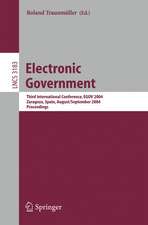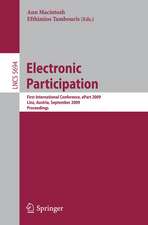Digital Government: E-Government Research, Case Studies, and Implementation: Integrated Series in Information Systems, cartea 17
Editat de Hsinchun Chen, Lawrence Brandt, Valerie Gregg, Roland Traunmüller, Sharon Dawes, Eduard Hovy, Ann Macintosh, Catherine A. Larsonen Limba Engleză Hardback – 10 dec 2007
| Toate formatele și edițiile | Preț | Express |
|---|---|---|
| Paperback (1) | 750.06 lei 6-8 săpt. | |
| Springer Us – 23 noi 2010 | 750.06 lei 6-8 săpt. | |
| Hardback (1) | 667.71 lei 6-8 săpt. | |
| Springer Us – 10 dec 2007 | 667.71 lei 6-8 săpt. |
Din seria Integrated Series in Information Systems
- 15%
 Preț: 646.62 lei
Preț: 646.62 lei - 20%
 Preț: 996.07 lei
Preț: 996.07 lei - 20%
 Preț: 1272.94 lei
Preț: 1272.94 lei -
 Preț: 389.11 lei
Preț: 389.11 lei - 20%
 Preț: 998.04 lei
Preț: 998.04 lei - 15%
 Preț: 654.43 lei
Preț: 654.43 lei - 20%
 Preț: 1933.71 lei
Preț: 1933.71 lei -
 Preț: 388.52 lei
Preț: 388.52 lei - 15%
 Preț: 646.11 lei
Preț: 646.11 lei - 15%
 Preț: 711.89 lei
Preț: 711.89 lei -
 Preț: 393.52 lei
Preț: 393.52 lei - 15%
 Preț: 644.82 lei
Preț: 644.82 lei - 18%
 Preț: 955.25 lei
Preț: 955.25 lei - 5%
 Preț: 1280.25 lei
Preț: 1280.25 lei - 15%
 Preț: 580.97 lei
Preț: 580.97 lei - 15%
 Preț: 638.11 lei
Preț: 638.11 lei - 20%
 Preț: 1277.24 lei
Preț: 1277.24 lei - 20%
 Preț: 1215.14 lei
Preț: 1215.14 lei - 20%
 Preț: 638.37 lei
Preț: 638.37 lei - 5%
 Preț: 1801.57 lei
Preț: 1801.57 lei - 18%
 Preț: 952.72 lei
Preț: 952.72 lei - 15%
 Preț: 653.14 lei
Preț: 653.14 lei - 20%
 Preț: 995.75 lei
Preț: 995.75 lei - 20%
 Preț: 649.28 lei
Preț: 649.28 lei
Preț: 667.71 lei
Preț vechi: 785.54 lei
-15% Nou
Puncte Express: 1002
Preț estimativ în valută:
127.78€ • 138.75$ • 107.34£
127.78€ • 138.75$ • 107.34£
Carte tipărită la comandă
Livrare economică 22 aprilie-06 mai
Preluare comenzi: 021 569.72.76
Specificații
ISBN-13: 9780387716107
ISBN-10: 0387716106
Pagini: 730
Ilustrații: LVIII, 730 p.
Dimensiuni: 155 x 235 x 40 mm
Greutate: 1.18 kg
Ediția:2008
Editura: Springer Us
Colecția Springer
Seria Integrated Series in Information Systems
Locul publicării:New York, NY, United States
ISBN-10: 0387716106
Pagini: 730
Ilustrații: LVIII, 730 p.
Dimensiuni: 155 x 235 x 40 mm
Greutate: 1.18 kg
Ediția:2008
Editura: Springer Us
Colecția Springer
Seria Integrated Series in Information Systems
Locul publicării:New York, NY, United States
Public țintă
ResearchCuprins
Foundations of Digital Government and Public Policy.- Foundations of Digital Government.- Discipline or Interdisciplinary Study Domain? Challenges and Promises in Electronic Government Research.- An Outline for the Foundations of Digital Government Research.- Lost In Competition? The State of the Art in E-Government Research.- E-Democracy and E-Participation Research in Europe.- to Digital Government Research in Public Policy and Management.- Privacy in an Electronic Government Context.- Accessibility of Federal Electronic Government.- The Current State of Electronic Voting in the United States.- E-Enabling the Mobile Legislator.- Information Technology Research.- History of Digital Government Research in the United States.- Data and Knowledge Integration for e-Government.- Ontologies in the Legal Domain.- Public Safety Information Sharing: An Ontological Perspective.- Collaborative Cyberinfrastructure for Transnational Digital Government.- Semantics-Based Threat Structure Mining for Homeland Security.- Identity Management for e-Government Services.- Feature Integration for Geospatial Information: A Review and Outlook.- Geoinformatics of Hotspot Detection and Prioritization for Digital Governance.- Geoinformation Technologies to Support Collaborative Emergency Management.- Sustainable Cross-Boundary Information Sharing.- Urbansim: Using Simulation to Inform Public Deliberation and Decision-Making.- Case Studies.- Taking Best Practice Forward.- Epetitioning in the Scottish Parliament.- Citizen Access to Government Statistical Information.- Infectious Disease Informatics and Syndromic Surveillance.- Supporting Domain-Specific Digital Libraries in Government: Two Case Studies.- Business-Technology Alignments in e-Government: A Large-Scale Taiwan Government Electronic Record Management Systems Study.- Research and Development of Key Technologies for e-Government: Case Studies in China.- New Zealand's 2006 Census Online: A Case Study.- Multidisciplinary e-Government Research and Education as a Catalyst for Effective Information Technology Transfer.- A Hybrid e-Government Model: Case Studies in Shanghai.
Textul de pe ultima copertă
New information technologies are being applied swiftly to all levels of government service: local, county, regional and even national and international. Information technology (IT) is being used to improve data management and data sharing, planning and decision support, service delivery, and more. Application areas affected by government mandates to improve e-government service include healthcare and safety; law enforcement, security, and justice; education; land use; and many others. Information technology is being used to increase public access to information, to provide more convenient and timely transaction services, and to increase citizen participation in the establishment of government regulations and other processes. DIGITAL GOVERNMENT: E-Government Research, Case Studies, and Implementation provides the field with a definitive, interdisciplinary, and understandable review of recent IT and related research of particular importance to digital government. The book also includes explorations of current and future policy implications, and case studies of successful applications in a variety of government settings.
The book has been organized into three parts: Unit 1 covers the international foundations of digital government and related social, public, and legal issues (such as privacy, confidentiality, trust and security) that are evolving from governments’ new ways of doing business. Unit 2 examines current IT research that is impacting the advancement of digital government purposes and initiatives. In this section, a wide range of technologies are discussed with the objective of outlining a framework of state-of-the-art technologies showing the most promise for e-government initiatives. Unit 3 highlights case studies and applications of successful e-government initiatives from around the world which have wider lessons and implications. High impact projects are explored in detail, with a "lessons learned" discussion included witheach case study. Each chapter is accompanied by references, suggested additional readings, online resources, and questions for discussion.
The book has been organized into three parts: Unit 1 covers the international foundations of digital government and related social, public, and legal issues (such as privacy, confidentiality, trust and security) that are evolving from governments’ new ways of doing business. Unit 2 examines current IT research that is impacting the advancement of digital government purposes and initiatives. In this section, a wide range of technologies are discussed with the objective of outlining a framework of state-of-the-art technologies showing the most promise for e-government initiatives. Unit 3 highlights case studies and applications of successful e-government initiatives from around the world which have wider lessons and implications. High impact projects are explored in detail, with a "lessons learned" discussion included witheach case study. Each chapter is accompanied by references, suggested additional readings, online resources, and questions for discussion.
Caracteristici
Information technology - as it has with so many aspects of our business and everyday lives - is dramatically changing the way government manages data, shares data, plans, provides decision support and delivers services. At the core of all these changes is digital government or e-government. This is the first systematic survey treatment of the area written by those individuals who are at the leading edge of the field Given the support and interest in digital government initiatives worldwide, this book will fill a vacuum for a survey textbook treatment on the topic that can be used in variety of practical and academic settings in Information Systems, Computer Science, Policy Studies/Political Science and Business




















